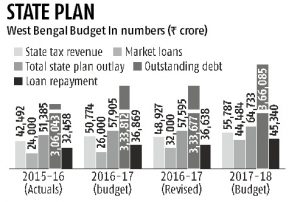Main Features of budgets of West Bengal :-
In Feb 2017 West Bengal Finance Minister Amit Mitra presented tax-free Budget even as the redemption of market loans is set to peak at the beginning of the next financial year, further constraining the state’s weak finances.
- Budget provides value-added tax (VAT) relief to small businesses and doling out Rs 50,000 each to about 50,000 skilled workers who have returned to West Bengal from other states after being left jobless due to the note ban.
- The state’s plan outlay will increase by around 12 per cent for 2017-18 at Rs 64,733 crore.
- Financial disarray in West Bengal can be assessed from the fact that in 2017-18 nearly 80 per cent of state’s tax revenues, pegged at around Rs 55,787 crore, will go towards the loan repayment bill, which is around Rs 45,340 crore (against Rs 36,638 crore in 2016-17).

- According to the West Bengal Budget document, repayment obligations on account of institutional loans, including market loans, for West Bengal in 2017-18 were Rs 12,689 crore, against Rs 4,189 crore in 2016-17 (revised), an increase of more than 200 per cent. West Bengal’s outstanding debt in the next fiscal is set to touch Rs 3,66,085 crore.
- The state’s market borrowing in 2017-18 is set at Rs 44,840 crore, against Rs 32,000 crore in the present fiscal year, a rise of about 40 per cent.
Taxation in Budget:-
1.Changes proposed in WBVAT Act, 2003:-
- Threshold for payment of tax:-
In order to give relief to the small businesses, it is proposed to increase the threshold for payment of tax from Rs. 10 lakh to Rs.20 lakh.
- VAT Registration:-
A small section of dealers still have to submit hard copies of the registration documents in the VAT offices. It is proposed in the budget to completely dispense with the requirement of submitting hard copies of registration documents to the VAT offices
- Submission of separate audit report:-
It is proposed to completely abolish the provision of submission of separate VAT audit report. Instead the dealers may submit the income audit report which will be accepted as a VAT audit report as other purposes.
VAT Refund:-
In order to facilitate early refund, It is proposed that all pending refund cases will have to be disposed of and enclosed between 31st December 2017.
- Composition scheme:-
Presently, only traders with annual turnover to less than Rs. 50 lakh are covered under the Composition Scheme in which there is a nominal VAT liability. It is proposed in the budget to bring small manufacturers whose annual turnover is less than Rs. 50 lakh under the Composition scheme
- Tax relief:-
It is proposed in the budget to exempt some environment‐friendly items like Bio‐ diesel, Biomass Bricket, Solar water heater, plates and cups made up of Saal leaf, tiles of terracotta, etc and also some items for common use like kerosene stove, hair band and hair clip, etc.
- Cess on tea:-
It is proposed in the budget to extend the exemption on payment of primary education and rural employment cess on tea for a further period of one year upto 31st March 2018.
- Stamp Duty and Registration:-
- It is proposed in the budget to reduce the Stamp Duty on Agreement to Sale from the present rate of 5 to 7 percent to 2 percent. In order to get the benefit of the reduced rate, the registration has to be done within a period of 4 years from the date of agreement on payment of the balance stamp duty.
- It is also proposed to reduce the rate of Stamp Duty on a few transactions of stock exchanges, like proprietary accounts, currency, interest and debt security and bond.
- It is also proposed to reduce the rate of registration fee on all by 9 percent.
- It is also proposed to incentivise early registration of properties by reducing the registration fee by 20 percent if the registration is done within one year from the date of completion of property.